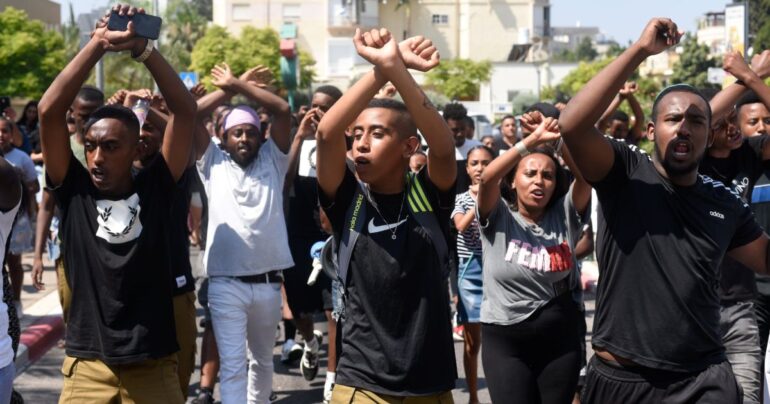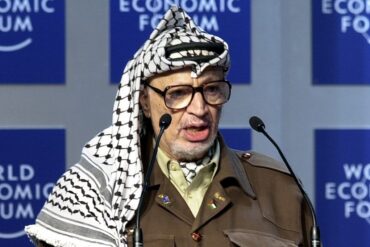Angry protests erupted in Israel this week over Sunday’s killing of 19-year-old Ethiopian Israeli Solomon Tekka by an off duty police officer.
The officer, who reportedly shot the ground with a bullet that ricocheted up and mortally wounded the unarmed teenager, will likely be charged with negligent homicide.
The Ethiopian community is demanding justice and systemic changes that would end the discrimination they face in Israeli society.
Thousands of demonstrators took to the streets on Tuesday, shutting down a dozen major intersections and creating major traffic jams while chanting “End the killing, end the racism!”
In the face of burning tires and overturning cars , police initiated the closure of important highways.
The protests followed a funeral for Tekka at which hundreds of people escorted the slain teenager’s body.
“My child had a love of life and joy of life,” said the boy’s father.
“We respect the laws and customs. Why are we not respected? We have to live together. Enough! Let us be at peace. I want to be the last parent to bury their child.”
Member of Knesset Moshe Arbel (Shas) also eulogized Tekka at the funeral.
“When a dead body is found,” he said. “The responsibility belongs to the city elders. The leaders of the people have responsibility. We’re here to take that responsibility. To come and look in the eyes of the Tekka family and this entire glorious community – and say forgive us that that we didn’t do enough.”
Jews from Ethiopia, who largely identify as descending from the Hebrew tribe of Dan, were in many ways set up to fail when they first arrived in Israel during the 1980s and 90s.
Despite their rich experience with livestock and agriculture, the immigrants were absorbed into urban areas in Israel’s most westernized regions.
Hebrews fully identifying with the story of Israel came back to their homeland seeking to rejoin their people but were transformed by an unfamiliar urban environment and challenging integration process over a couple generations into a struggling minority facing institutional discrimination – almost as if Israel’s westernized elites simply sought to turn Ethiopian Jews into a Hebrew-speaking version of what they perceive America’s black community to be.
There’s a strong sense among Israel’s Ethiopian community that they are second-class citizens suffering from institutionalized racism. Ethiopian leaders told the New York Times in 2015 that the community is constantly discriminated against when it comes to housing, education and employment.
But while anti-black racism runs deep in the United States, it’s far more superficial and still less systemic in Israel, mostly existing in the country’s most westernized pockets. While we can point to many factors responsible for racist policies and bigoted attitudes between Jews in Israeli society, one factor that is almost always ignored is the desire of Israel’s ruling class and cultural elites to be part of the West.
This desire leads to the privileging of Israelis from western Diasporas at the expense of those coming home from the global periphery, leading the sectors of Israeli society that most identify with the West to on some level adopt the West’s racism and even direct it at fellow Jews.
What’s interesting to note is that of all the sectors of Israeli society, the one that has absorbed Ethiopians most successfully has been the national-religious communities in the West Bank.
While this might seem counterintuitive at first glance, it actually makes a lot of sense given that the West Bank Judeans share the overall values and worldview that initially motivated the Jews of Ethiopia to return home to Israel.
While it’s easy to criticize the ultra-nationalism of Jews living in the territories, as well as how these Israelis relate to their Palestinian neighbors, bigotry between Jews from different parts of the world is for the most part non-existent in the Samaria and Judea regions. In Israel’s most ideologically nationalist communities, it’s common for most families to feature parents from different Diasporas.
In “western Israel” (specifically the Gush Dan region), Israelis tend to generally marry and interact with those whose families come from the same Diasporas, marginalizing Jews of different cultural backgrounds. But in “eastern Israel” where Jews are consciously living Jewish history, Israelis from Europe, North Africa, Ethiopia, the Americas, India and the former Soviet Union all build families and communities together as equals.
The Jewish nationalism that exists in the West Bank should be recognized as healthier and more organic to the region than the European-style ethno-nationalism or western individualism of Gush Dan (despite still needing to expand to also include the gentiles of the country). This deeper nationalism recognizes Ethiopian Jews as long lost brothers returning home and has allowed for their full integration as equal partners in rebuilding the nation of Israel.
As the contrast between the treatment and lived realities of Ethiopian Jews east and west of the green line demonstrates, Jews fully living their people’s story and aspirations have the potential to create social norms and models able to challenge liberal-western models on universalist grounds.





